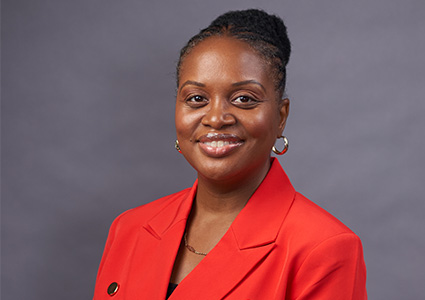The Role of Immigrants in Leadership at PWIs
By Esther Lawrence
Esther Lawrence, assistant dean of the School of Business, explored the intersectionality of African and Afro-Caribbean leaders at predominantly white institutions of higher education for her dissertation in Stockton’s Organizational Leadership program. Dr. Lawrence successfully defended her dissertation and earned her Ed.D. in November. Here she shares insights from her research.
Why did you select this topic and your approach?

When I embarked on my doctoral journey in the Organizational Leadership program in fall 2019, I was curious about the lived experiences of African and Afro-Caribbean leaders at predominantly white institutions (PWI) in higher education. As a daughter of Afro-Caribbean immigrants, I wondered if African and Afro-Caribbean leaders had experienced a similar phenomenon as I did and how far back these experiences went.
The purpose of my study was to explore how immigrants of African descent, who I affectionately refer to as “IAD,” overcame challenges and navigated inequities across the intersections of their culture, race and gender at PWI of higher education. In addition, the intent of this study was to uncover and address the fact that IAD administrators at PWI of higher education are erroneously categorized into a subpopulation of African Americans.
The Black diaspora encompasses many cultures and ethnicities of different countries, therefore all Black people, particularly the ones who migrate to America may not identify as African American. Our Blackness is not monolithic, and I wanted to bring awareness and education on this topic since our intersecting/overlapping identities can affect the ways we socialize and the ways we lead.
In terms of sustainability, we have to shift our culture to embrace the infusion of DEI into the fabric of our institution through our curriculum, processes and policies. This infusion begins with the people."
A narrative inquiry approach was used to explore and analyze the stories of the IAD in chronological order. I engaged in an exercise of retelling their stories with the intent that higher education leaders would take note and adapt/adjust their support systems for IAD. Conducting a narrative inquiry allowed space for these stories to be told unequivocally and to obtain a richer appreciation of the phenomena that IAD encountered. What my study revealed was that IAD experienced isolation, invisibility, loneliness, pressure to assimilate, anxiety, high blood pressure and miscarriages as a result of working in leadership roles at a PWI.
What is the relevance to Stockton as a PWI?
My study aimed to provide awareness that there is a void in the scholarly literature and that the ethnicities, identities and cultures of IAD administrators at PWI of higher education needed be explored. I also wanted provide awareness of the mental and physical health implications of IAD leaders at PWI of higher education so that we can do better by them. There is an entire subculture of diverse voices that have been discounted from scholarly literature and PWI that needs to be acknowledged.
The overall objective of this study was to educate leaders at PWI of higher education on the importance of recognizing the intersectional identities of their IAD administrators. In 2020, during a global pandemic, organizations and institutions recommitted themselves to advocate for issues related to diversity, equity and inclusion. It’s now 2023, and PWI campuses, including Stockton University, still need to work on fostering inclusive learning environments along with engagement programs/events, measurable and scalable outcomes, climate surveys, employee development, affinity groups and multicultural centers for all university stakeholders. More importantly, funding is needed. DEI offices, staff, programs, initiatives, speakers and events all cost money. A commitment to DEI is not genuine without the monetary investment.
What might Stockton implement from your recommendations?
Provide funding
Be intentional, strategic and sincere about provide funding and increase the budget dedicated to DEI offices, committees and initiatives.
Create measurable and sustainable goals
I’ve found that check box initiatives have been created to pacify the university community. These initiatives are hardly intentional and don’t even get close to the root of the issues. Some of these initiatives may also only serve one particular sub-group and overlook the others. This is where diverse voices come into play to be able to point out these discrepancies.
We cannot offer across-the-board approaches or assume that one size will fit all. We have to do the work to offer initiatives and programming that’s specifically designed for underrepresented groups. We also have to get into a habit of gathering and analyzing the necessary data to gain insight from the community on how we can improve. In terms of sustainability, we have to shift our culture to embrace the infusion of DEI into the fabric of our institution through our curriculum, processes and policies. This infusion begins with the people.
Esther Lawrence is the assistant dean for the School of Business and member of the Committee on Campus Diversity and Inclusion Excellence.


